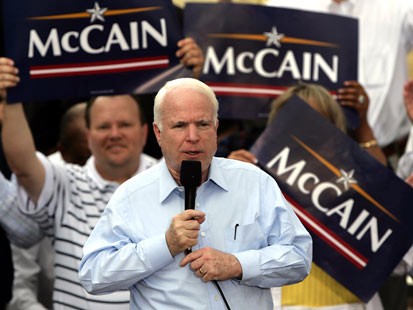WHO WILL WIN THE RACE? – THE SENATE OR THE PUBLIC?
OUR SENATE IS RACING TO COMPLETE A MISSION IT SHOULD NEVER HAVE TAKEN ON.
–Upending its constitutional place as the deliberative body in our bicameral legislature, the Senate is planning to vote tonight–instead of tomorrow–on a massive ‘package’ that includes the $700 billion in giveaways for financial entities already rejected by the U.S. House.
The senators’ reason for taking up this legislation tonight, of course, is simply to outwit and outflank the public. When the House was taking up the bailout, emails and calls overwhelmed the Capitol. The senators know that. Further public demonstrations are being organized for tomorrow. The senators know that.
In taking up the bailout, the senate is including some measures not included in the House version–including one provision that may actually be a good idea, raising FDIC insurance on bank deposits to cover up to $250,000 from its current $100,000. This provision could have been rushed through both houses pretty efficiently.
For the rest, though, the Senate is rushing pell-mell to vote against fiscal probity (as well as to reward bad behavior by some very well-heeled entities). How do we know this? Simple. Even for those of us who are not economists, who did not major in finance or commerce in college, we can use logic.
First logical step: Think; which parts of the bailout are certainty, and which are not?
Certainty: Up to $700 billion is authorized TO BUY BAD MORTGAGES AND MYSTERIOUS MORTGAGE-RELATED PRODUCTS. We know that this is certainty, because this is the guts of the bailout bill. This is its central purpose.
Certainty: Any immediate financial benefit from these purchases will accrue to the business entities (dignified by the term ‘institutions’) that sell them. If the mortgage products were profitable and valuable, the companies would not be selling them. This is no secret; this aspect of the deal is again part of its guts.
Certainty: Thus, to a logical certainty, these purchases stand to transfer up to $700 billion to financial entities that we do not yet know the names of, for ‘troubled assets.’ This in spite of the fact that even supporters of the bailout are criticizing the conduct of the businesses that stand to receive this money.
Now to some uncertainties:
Uncertainty: We are told that some of these troubled assets may eventually improve in value or become valuable. But the bailout includes no guarantee, no amounts, not even a percentage, and not even a timeline. Related:
Uncertainty: We are told that defaults and foreclosures led to this problem. But we are not told what proportion of the $700 billion is to be spent buying mortgages, and what proportion will go instead to paying lenders, insurance companies, etc., for their bad artificial mortgage products–derivatives and the rest.
Uncertainty: We are told that these purchases are needed to ‘stabilize the markets.’ But the bailout includes no guarantee and not even a kicker clause–something saying that the purchases will be voided or revoked, etc., if they do not stabilize the markets.
Uncertainty: We are told that credit is drying up–and indeed it has been, for months now–
with some implication that purchasing these bad mortgage products will free up monies to be lent to Americans who want to buy houses or cars or college educations. This argument was made by commentator Maria Bartiromo, who used to be pretty good, on Chris Matthews’ Nerfball last night. (Bartiromo did not mention the derivatives, of course.) But the bailout includes no guarantee and again, no kick-out clause, saying that unless the lenders turn around and lend, the deals will be rescinded.
Uncertainty: We are told that the economy needs this bailout because of job loss, housing foreclosures, unemployment. But the bailout does not include a guarantee or even a strong argument that it will improve employment or housing. As other writers have pointed out, it does not address health care costs, the single biggest reason, aside from or along with job loss, why ordinary householders default on mortgages. It also has nothing to address the inflation, let alone hyper-inflation, that a full trillion injected into the financial sector–at the cost of watering the dollar and trying to borrow yet more from abroad–may well unleash.
For good measure, the bailout does not include specifics on how to make real estate companies and agents bear some of the pain for pushing real estate deals that result in default.
And–of all the cruelties–it still does not include specifics designed to prevent foreclosures.
If we really wanted to ‘stabilize’ the housing market, we would start with the FDIC measure and a moratorium on foreclosures under some circumstances (with reasonable conditions).
Net: This bill is certainty as a bailout. Uncertainty–to put it nicely–as a rescue.


